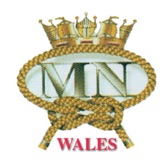Loss of the Germanic - By Colston Hicks

SS Germanic sailed from Cardiff on the 8th January 1941 for Oban, to join convoy for Atlantic crossing to Halifax, Nova Scotia. In Oban standing on bridge with Skipper, Captain Emerson (who was a perfect gentleman and sailor who (I think) had put his age back 10 years to stay at sea!). I pointed out the huge bright yellow equal limbed cross on some of the ships to show that they had been degaussed against magnetic mines. I pointed out that these crosses were perfect targets for U-Boats in poor visibility and should be removed at once. He said you have point there boy, I will bring it up at the convoy conference in the morning. The skipper was ‘busy’ for the next few days, crossing the Atlantic, and very sadly collapsed and died as soon as we arrived in Halifax. Thus I never knew what happened in the conference but I never saw a huge bright yellow cross on a ship again.
On returning from Halifax in convoy HX-115, the Germanic (Skipper now Richard Mortimer) was torpedoed and sunk about 200 miles south of the southwest tip of Iceland, on the 29th March. It is believed to be the most northerly torpedoing in the Battle of the Atlantic, from 1939 to 1943. Five members of the crew were killed. Fortunately for us an HM corvette (HMS Dianella) had lost its asdic and was allowed to call off chasing u-boats and proceed to rescue survivors. Germanic was loaded with grain and did not sink for about six hours when the grain swelled and finally burst the hull wide open, We were taken to Londonderry and then by ferry to the UK. During the six hours in the lifeboat one survivor, the ship’s second engineer, apparently not injured, kept moaning and asking for water. The rest of the survivors were quite sympathetic but tended to be a little annoyed why an uninjured person should make such fuss.
Later the corvette’s medic explained to us that the second engineer had suffered a piece of shrapnel slicing his scrotum in two. He was dealt with separately from the uninjured survivors so I do not know what happened to him. Being a radio officer I was also the morse lamp signaller, when the corvette approached our lifeboat it flashed ‘what ship’, I replied ‘Germanic’. Later on when we were all rescued and on board the corvette one officer told us ‘ you are lucky, one gunner wanted to fill the lifeboat with machine gun bullets as soon as ‘German’ was signalled.
Colston Hicks, 2nd Radio Officer.
Mem. No. 191
